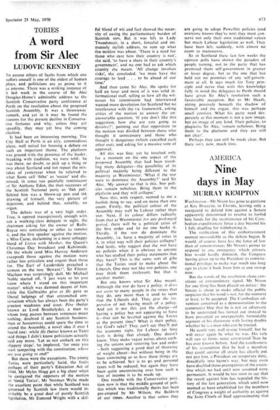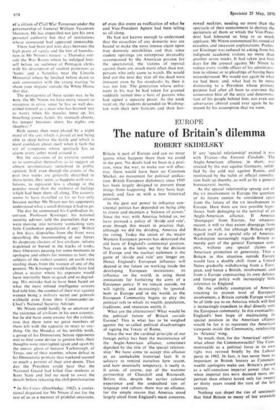AMERICA
Nine days in May
MURRAY KEMPTON
Washington—Mr Nixon has gone to garrison at Key Biscayne, in Florida, leaving only a rearguard to defend him against a Senate apparently determined to resolve to forbid him funds for the maintenance of his Cam- bodian expeditionary force a day beyond his I July deadline for withdrawing it.
The ratification of this embarrassment seemed unavoidable as the debate began. It would, of course, have less the force of law than of remonstrance; Mr Nixon's power to respond to any emergency which attracts him would hardly diminish. the Congress having given up to the President its constitu- tional privilege to make war much too long ago to claim it back from him at one swoop now.
But the words of the resolution alone con- stitute an extraordinary signal. Mr Nixon for one thing has been placed on notice: the Senate is about to make official the public suspicion that his word is not, for the moment at least, to be accepted. The Cambodian ad- venture conceived as a demonstration to the communist bloc that he is not an adversary to be underrated has turned out instead to have presented an unexpectedly formidable segment of his electorate with lasting doubts whether he is a man who can be trusted.
He could very well rescue himself, but he will never again be what he was. His rule will run to limits more constrictecrlhan he has ever known before. And the carelessness of his assumption that he had a mandate that could survive all strain has clearly put not just him, a President on temporary duty, dreadfully into harm's way, but may even have disabled those prerogatives of the execu- tive which we had until now assumed were permanent. It would be too soon to say that the revolt against him has repealed the his- tory of the last generation. which until now seemed to have established for the members of Congress a weight of authority as against the Joint Chiefs of Staff approximating that of a citizen of Civil War Tennessee under the governorship of General William Tecumseh Sherman. He has imperilled not just his own personal authority but that of institutions whose command had appeared immutable. There had been just nine days between the high point of vanity and the low of humilia- tion in Mr Nixon's tenure: a Thursday out- side the War Room where he indulged him- self before an audience of Pentagon clerks with his description of student protesters as 'bums' and a Saturday near the Lincoln Memorial where he lurched before dawn to seek community with the young waiting `to shout your slogans' outside the White House that day.
The protagonist of these scenes was, to be sure, the Mr Nixon we have every reason to recognise in crisis, since he has so well des- cribed himself as a man who has learned 'not to worry when his muscles tense up, his breathing comes faster, his stomach churns, his temper becomes short, his nights are sleepless'.*
Both scenes then were played by a night mind of the sort which is proud of not being able to sleep before the battle and which is most confident about itself when it feels the stir of symptoms whose spectacle has to alarm every sober mind around it.
But the occasions of its exercise seemed so to contradict themselves as to suggest an almost revolutionary turnabout in public opinion. Still, even though the events of the past two weeks are generally described in those terms, they seem, as happens with revo- lutions, to represent less a change in the popular mood than the outburst of feelings which had been there all along. The country seems to have travelled so far so fast only because neither Mr Nixon nor his opponents understood what a small distance it had to go.
The day he announced his Cambodian in- cursion, Professor Kissinger, his national security adviser, told the journalists that we were moving into territory 'containing very little Cambodian population if any'. Within a few days, dispatches from the front were describing the incommoding of our forces by desperate clusters of lost civilians, infants napalmed or buried in the tracks of tanks, their liberators pausing for some moments to apologise and others for minutes to loot; the soldiers of the richest country on earth were stealing shoes from the women of one of the poorest. Mr Kissinger would hardly have lied about a matter where his exposure would have inevitably been so quick and so degrad- ing. His mistake had to have been based on what the most refined intelligence sources had told him, the conduct of their war against women being a military secret our generals withhold even from their Commander-in- Chiefs National Security Adviser.
Mr Nixon could hardly be so unaware of the existence of civilians in his own country, but he did have some excuse for the calcula- tion that there were no great numbers of them left with the capacity to react to any- thing. On the Monday of his terrible week, a group of his Democratic Senate opponents met to find some device to govern him; their thoughts were interrupted again and again by the uneasy ghost of Senator Yarborough, of Texas, one of their number, whose defeat in his Democratic primary that weekend seemed so much a portent of their own doom. That day the President could tiear that the National Guard had killed fur students at Kent State and feel no need to await the details before releasing the chill proclamation • In Six Crises (Doubleday, 1962), a confes- sional disguised for Mr Nixon if not for the rest of us as a memoir of prideful occasions. of even this event as ratification of what he and Vice-President Agnew had been telling us all along.
He had not known enough to understand that the casualties of any domestic war are bound to make the most intense claim upon true domestic sensibilities and that, since student uprisings are enterprises invariably accompanied by the American passion for the spectatorial, the victims of reprisal against them are, much more often than not, persons who only came to watch. He would find out the next day that all the dead were innocent even by his standards; by then it was too late. The generation whose enlist- ment in his war he had taken for granted suddenly turned into a host of parents who had signed a separate peace. As the week went on, the students descended on Washing- ton with their new haircuts and their bor- rowed neckties, needing no more than the spectacle of their containment to destroy the caricature of them at which the Vice-Presi- dent had laboured so long to so much applause. Mr Nixon commenced his round of ceaseless and incessant explanations. Profes- sor Kissinger was reduced to asking from his indignant academic visitors no more than another seven weeks. It had taken just four days for the arousal against Mr Nixon to reduce every visible officer of his administra- tion to silence or to pleadings of having been misunderstood. We would not again be what we had been; and, what had to be more distressing to a President whose primary purpose had after all been to convince the communist bloc of the unity and determina- tion of his people behind him, not even our adversaries abroad could ever again be be- mused by his assumption that we were.



































 Previous page
Previous page